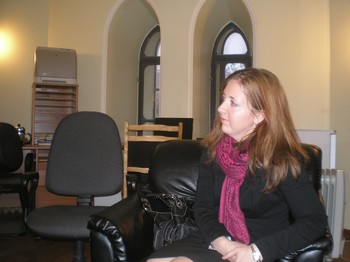Laura Keith often wonders how she wound up working as a fundraiser for a non-profit ― a religious non-profit at that ― in Russia’s capital city.
“I was in a post-graduate program at George Washington University, studying national security and Russian economics,” says the northwestern Iowa native. “I received a one-year fellowship to come to Moscow and wound up developing a corporate responsibility program for a trans-national corporation. I thought that was right up my alley.”
In Moscow she met a couple who were attending the Moscow Protestant Chaplaincy (MPC) ― the English-language Protestant church co-sponsored by the Presbyterian Church (U.S.A.) ― which celebrated its 50th anniversary last weekend (Oct. 14). One of her friends interviewed for a job with MPC as development director but turned down the position and suggested Keith give it a look.
“The last thing on my mind was working for a religious non-profit in Russia, particularly as a development director,” she says. But I met with a member MPC’s church council and was convicted.”
Keith has been with MPC for about a year and has developed a sure sense of call. “I could only do this in Russia, I think, because I have such a passion for this place,” she says, adding that several factors in Russian culture make the job intriguing.
In addition to worship and Bible study, MPC engages in a variety of social ministries that reach out to the elderly, poor, children and families and immigrant populations of Moscow, all of them deeply marginalized in the tough economic times this country currently faces.
“I love talking with Russian businessmen about volunteerism, because it just doesn’t exist in this culture,” she says. “The idea that anyone would do something out of commitment rather than for the money is just beyond them. I love the idea of talking to these wealthy, mostly young guys, about giving back to their society.”
Russian culture is very individualistic in these post-Soviet Union days “and as a Christian I like exploring with Russians the idea of ‘who is my neighbor?’” Keith says. The idea of helping those one doesn’t know ― or even like, in this country where prejudices and biases are sometimes rampant ― is one Keith enjoys challenging her Russian acquaintances to consider.
As Russia develops a new class of highly-educated, skilled workers, the country is relying less and less on an expatriate labor force. As MPC’s development director, Keith finds it increasingly necessary to reach out to Russian business and civic leaders for support for MPC’s ministries. “It’s great fun, because they don’t understand what we’re doing but are very curious.”
As Keith gets around, she hopes MPC’s increasing visibility in Russia’s capital will make it an example and model for social ministry by others. “I never would have thought that this ministry would have been the outcome of my [academic] fellowship,” she says. “I just love matching resources for the Kingdom.”

